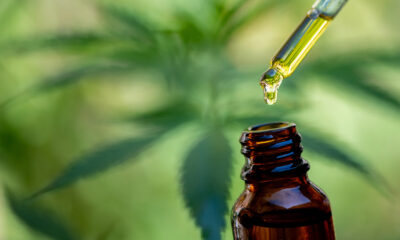
Politics
Trump’s Surgeon General Is Mostly Good On Marijuana
Even if Jerome Adams is pushing some questionable data on youth use, so far, Trump’s choice as surgeon general has been positive for cannabis.
When he took office in August 2017, Jerome Adams, the Trump Administration’s surgeon general, identified the ongoing opiate-overdose crisis and untreated mental illness as the country’s top public health challenges — in his words, a “scourge” — and, thus, his main priorities while on the job.
But since Adams is surgeon general of the United States in the era of cannabis legalization and medical marijuana, drug-policy reform is on his to-do list by default. (You could argue, with strong evidence in support, that all are interrelated.)
In this, he has mostly stuck to declaring the obvious. It could be a reflection of our basement-low expectations of government officials on the marijuana question, but in the context provided by other Trump Administration officials, Adams has been a net benefit, even if he can’t quite help himself from pushing at least one questionable line based on selective data.
In December, Adams told an audience in Boston that federal drug scheduling, which classifies marijuana as highly dangerous, highly addictive, and with no known medical benefit (three assertions simply not supported by evidence), is suppressing research and needs to be re-examined. Not a bold statement by any means, it’s something that researchers have been openly acknowledging for years, but repetition by the chief medical officer of the United States is amplification.
Adams later clarified that he personally isn’t in favor of legalization or rescheduling, while offering the qualifier that he does want “evidence-based findings.” You can’t have any evidence without research, and since research requires rescheduling, it’s hard to find the negative.
Last week — which was “National Drug and Alcohol Facts Week” — after Adams posted a marijuana-related tweet that was somewhat negative, other doctors called him out on it. The surgeon general (and/or his social media team) responded by self-editing and offering a tacit endorsement of medical marijuana use, and for children, no less.
Marijuana Moment noted Adams’s progress on Jan. 23. A tweet declaring, in part, “No child should ever use #marijuana. It is not safe for the developing brain and it affects learning and memory,” was deleted and replaced with “No child should use #marijuana/products non medically.”
No child should use #marijuana/ products non medically. Not safe for the developing brain & affects learning and memory. Possible short-term effects are: slower reaction times, anxiety, fear, distrust, and a faster heart rate. Over time, it can risk for addiction. #NDAFW
— U.S. Surgeon General (@Surgeon_General) January 23, 2019
What Adams did was nothing more revolutionary than backing up the Food and Drug Administration, which last year approved marijuana-derived pharmaceutical drugs, the main active ingredient of which is CBD, or cannabidiol. CBD-based pharmaceuticals intended to treat intractable epilepsy in children are approved drugs in the United States. In a way, Adams’s tweet is merely an American doctor acknowledging this fact.
But the surgeon general doesn’t do much surgery. Adams’s job is a political office and so the surgeon general acknowledging that medical cannabis has value, for children, some of whom have had to fight in the courts in order to bring their preferred medication to school, is a political act.
He is by no means perfect. Adams also tweeted that marijuana is not a “safe and accepted medicine” and then wallowed in the depths with his @-ers. Adams argued, using his personal account, that youth use is on the rise due to a connection between tobacco vaporizer use and vaporizing marijuana and he even threw in a reference to gateway theory.
Dr. Tishler, I think you need to ask America’s communities that question. 1/3 youth who vape are vaping marijuana, states that OKed medicinal use saw in youth rec use, in midst of opioid epidemic, many with opioid use disorders say marijuana use was part of their journey.
— Jerome Adams (@JeromeAdamsMD) January 24, 2019
You could argue that that’s bad and unacceptable and canceled out any positive effect his official tweets might have had. You could also argue that a barely-noticed tweet from a personal account holds far less weight than an official declaration. Here’s what we have: a surgeon general who has to figure out what to do about tens of thousands of Americans dying every year from opiate overdoses, who admits that cannabis isn’t adequately researched and that it should be. That amounts to a critique of official American drug policy, from the country’s chief medical officer. That’s the takeaway most Americans will have and it’s mostly good.
TELL US, do you think medical marijuana has value for children?


























